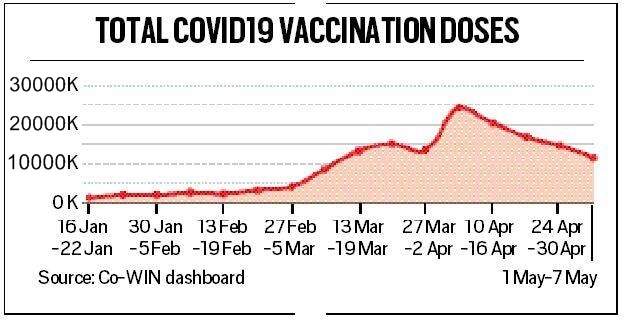Vaccine inequity gets worse: rural India, smaller hospitals hit
In the guidelines for the “Liberalised and Accelerated Phase 3 Strategy of Covid-19 Vaccination”, the Centre mandated prior online registration on the CoWin portal for the 18-44 years age group.
 Between January 16 and May 9, a total 16.84 crore vaccine doses were administered; the number of doses given in the week ending May 7 was, at 1.16 crore, the lowest in the last eight weeks.
Between January 16 and May 9, a total 16.84 crore vaccine doses were administered; the number of doses given in the week ending May 7 was, at 1.16 crore, the lowest in the last eight weeks.The slide in the number of vaccine doses administered in the week starting May 1, after the government “opened up” vaccination beyond priority groups, to its lowest level in eight weeks hides a further skew — indication that the inoculation process could be turning more inequitable than earlier.
In a vaccine market that continues to see a demand-supply mismatch, the revised vaccine procurement process builds in a skew against smaller hospitals in cities and towns in comparison to their bigger counterparts in simply getting access to the shots, and a more disconcerting urban-rural divide in terms of where healthcare facilities are vis-à-vis the already-established supply-chain map.
The skew is beginning to get reflected on two counts.
First, the ability of hospitals to procure vaccines and arrange shipments, alongside the impact that these factors may have on the landed cost of the shots for each facility, according to multiple players in the vaccine supply chain that The Indian Express spoke to.
Then there is the issue of mandatory Co-Win registration as part of the new decentralised distribution strategy, which potentially adds to an entry barrier that could be tougher to navigate for users in the hinterland, both in terms access to the platform and an English-only interface for users so far.
In the guidelines for the “Liberalised and Accelerated Phase 3 Strategy of Covid-19 Vaccination”, the Centre mandated prior online registration on the CoWin portal for the 18-44 years age group. Mandatory online registration introduces a skew in favour of urban centres, given that a little over half of India’s population has access to broadband Internet, while rural tele-density is under 60 per cent — with states including Bihar, Uttar Pradesh, Chhattisgarh, Jharkhand, and Madhya Pradesh having among the country’s lowest tele-density.
With vaccines in short supply in a market that is now open to competition, booking slots for vaccination — which frequently takes multiple attempts — is more difficult for those with less access and greater unfamiliarity with technology, including access to a smartphone or computer.
According to the Telecom Regulatory Authority of India (Trai), India’s overall tele-density is 87 per cent, with seven circles — Delhi, Himachal Pradesh, Kerala, Punjab, Tamil Nadu, Maharashtra and Karnataka — having more than 100 per cent tele-density, which indicates more than one connection per person. Smartphone penetration has a similar skew.
 Total Covid-19 vaccination doses
Total Covid-19 vaccination doses
“According to Trai, India has 58 Internet subscribers for every 100 people, which means there is a significant part of the population that does not have an Internet connection. This is the first thing that leads to a digital divide. There is also a lack of digital literacy. If people do not have digital literacy, how do people register themselves [for vaccination]?” Apurva Singh, Volunteer Legal Counsel at Software Freedom Law Centre, India, said.
The unavailability of the CoWin portal in languages other than English is an inherent entry barrier in the hinterland. “How will someone who does not know English register themselves for a vaccine dose?” Singh asked.
Incidentally, CoWin’s vaccinator mobile app, which is meant for those administering doses at vaccine centres, is available in 12 languages. Other government apps like Aarogya Setu, which provide an option to change the language, also allow vaccine registration only in English.
Again, CoWin is issuing API certificates in different Indian languages, allowing third-party app developers to develop slot finder and registration platforms in languages other than English. Mails seeking a comment sent to the Ministry of Health and Family Welfare and National Health Authority Chairman R S Sharma, did not elicit a response.
The CoWin app also allows those with the know-how to book appointments at vaccine centres outside the limits of their cities where available, potentially depriving rural beneficiaries of the jab.
Senior government officials have said that the idea behind mandating CoWin for the 18-44 group was to prevent crowding at vaccination centres. They have said that those who cannot access the online portal can register themselves for a jab at a Common Service Centre, or through an IVRS call centre number.
Between January 16 and May 9, a total 16.84 crore vaccine doses were administered; the number of doses given in the week ending May 7 was, at 1.16 crore, the lowest in the last eight weeks. The last time it was below 1 crore doses in a week was during the seven-day period ending March 12, after which the vaccination upswing began.
With the decision to procure 50 per cent of the vaccine output, the Centre has left state governments and private healthcare centres to scramble for the remaining doses. Private healthcare providers, corporate hospitals, and state governments are now practically on their own in organising logistics, in addition to managing procurement of what is now a rationed product. The new offshoots being created in the journey of Covid-19 vaccines from manufacturing units to the recipient are translating into potential delays and higher costs for the end-consumer.








